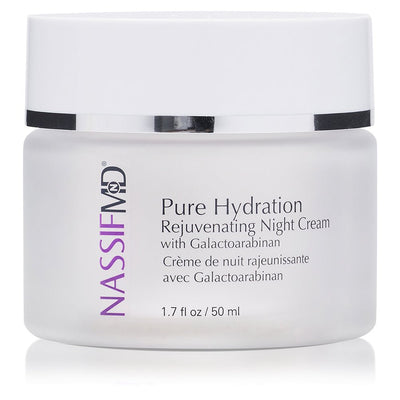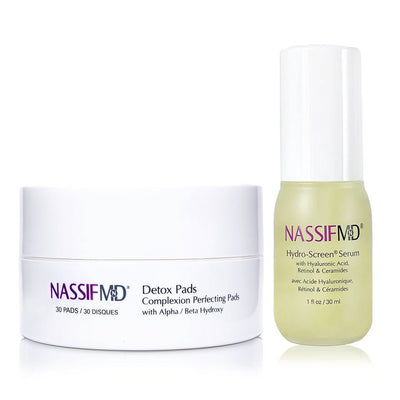How to Find the Perfect Exfoliator for Your Skin Type
No matter your skin type, exfoliation must be part of your skincare routine. Yes, even if you have dry, oily, or sensitive skin. If you’ve tried to exfoliate in the past and gave up because of red, irritated skin, you may need a different approach.
Today’s article will dive into all things exfoliation, and you’ll walk away with a new understanding of:
- What is exfoliation?
- What does exfoliating do?
- The best exfoliator for all skin types
- How to exfoliate as part of your natural skincare routine
What Does Exfoliating Do?
Exfoliation is the process of removing dead skin cells and impurities from the skin’s surface, allowing your natural beauty to shine through and skincare products to penetrate and work more effectively.
There are two types of exfoliation: physical and chemical.
Physical exfoliation includes using an abrasive ingredient, such as sugar or salt, to physically scrub off what sits on the top of the skin and in pores. Washing with an exfoliating scrub or using exfoliating gloves are good examples.
Chemical exfoliation includes using natural acids, such as alpha-hydroxy acids or beta-hydroxy acids, to remove the outer impurities and dead skin cells gently. Examples include:
- Salicylic acid
- Glycolic acid
- Lactic acid
- Phytic acid
We’ll come back to these hydroxy acids below, but first, let’s look at some of the benefits of exfoliation as one of your skincare routine steps.
Clears Damaged or Dead Skin Cells
Skin cells are constantly regenerating. Old and damaged cells slough off, and new skin cells replace them below. In addition, the skin faces a constant onslaught of environmental influences, including UV radiation from the sun, air pollution, and toxin exposure.
The natural process of skin cell turnover leaves dead skin cells and impurities on the surface of the epidermis (outer layer of skin). Exfoliation helps remove dead skin cells, toxins, and debris from the skin’s surface, exposing the younger skin cells below.
Unclogs Pores
Pores become clogged when dead skin cells, sweat, oil, and toxins become trapped in the skin. Clogged pores contribute to blackheads, whiteheads, acne, and a dull skin appearance.
Exfoliating the skin on the face and body cleans out pores, making them appear smaller. Exfoliation gives the skin a more even tone and texture while preventing breakouts.
Improves Skin Appearance
Skin exfoliation is an effective method for improving the skin’s appearance. With dead skin cells out of the way and clean pores, your skin may look brighter, more radiant, and younger. In addition, exfoliation allows your skincare products to penetrate and work more effectively, so you’ll reap the benefits of those active ingredients.
Are You Using the Right Exfoliator in Your Skincare Routine?
In addition to the overall importance of exfoliation, choosing the best exfoliator for your skin type is equally important.
Depending on your chosen product, you’ll typically want to exfoliate along with cleansing or after cleansing. Exfoliate before applying serums, moisturizers, and other skincare products. Some people will benefit from daily exfoliation, while others may choose to exfoliate a few times per week.
Let’s look at the best exfoliation options for different skincare types and specific NassifMD® products with supportive active ingredients.
Exfoliator for Oily Skin and Acne
If your skin tends to be oily or acne-prone, choose an exfoliator for oily skin that is effective at removing excess oil and reducing acne breakouts. Yet, you still want it to be gentle enough for your sensitive skin.
Salicylic acid is the best exfoliator for acne-prone skin and oily skin. Salicylic acid is a beta-hydroxy acid derived from the willow plant. It’s known for being a gentle exfoliant that reduces inflammation and helps improve acne.
Over-the-counter preparations, including facial cleansers, detox pads, masks, gels, and creams, contain 0.5% to 3% salicylic acid. For comparison, a chemical peel available at the dermatologist contains 20% to 30% salicylic acid.
Salicylic Acid Cleanser
One of the more common ways to incorporate salicylic acid in your skincare routine is by using a salicylic acid cleanser as an exfoliating face wash. However, our favorite product is the NassifMD® Detox Facial Pads – Original because each pad contains salicylic acid, glycolic acid, and lactic acid (more on these other hydroxy acids below) for a glowing complexion, fewer breakouts, and healthy-looking skin. They really are the best exfoliator for acne!
NassifMD® Detox Facial Pads – Original can be used daily after cleansing. Or, if you are in a pinch, use them instead of a cleanser. Read more in the article: Why Detox Pads Should Be a Staple in Your Skincare Routine.
Another salicylic acid option is the NassifMD® Micro-Spa Radiance Resurfacing Peel. This peel is a two-step home spa treatment. Step One is the Radiance Resurfacing Mask, and Step Two is the Radiance Activating AHA/BHA Gel. The gel includes salicylic acid as the star ingredient, working in synergy to exfoliate and nourish the skin.
Exfoliator for Dry Skin
On the other end of the skin spectrum is dry skin. With dry skin, it’s crucial to choose a facial exfoliator and body exfoliator that are also moisturizing and don’t dry out the skin even more.
Glycolic acid is the best type of exfoliator for dry skin. Glycolic acid is an alpha-hydroxy acid, naturally found in fruit, that’s naturally antibacterial and helps maintain the skin’s healthy pH. Glycolic acid is suitable for dry skin and dry skin that is acne-prone. You’ll find glycolic acid in facial cleansers, exfoliating scrubs, detox pads, and other skincare products.
Glycolic Acid
While glycolic acid is an exfoliator for all skin types, we especially love it for dry skin in NassifMD® Skin Perfecting Dual Action Scrub and NassifMD® Purifying Glycolic Facial Cleanser.
NassifMD® Skin Perfecting Dual Action Scrub is the perfect daily face and body exfoliator. It combines gentle physical exfoliation from Ecuadorian Ivory Palm seed powder with 10% glycolic acid as a gentle chemical exfoliator without drying the skin. The combination promotes skin renewal and rejuvenation. Vitamin C helps brighten skin from head to toe. It’s the best body exfoliator to use in your daily skincare routine.
As a face exfoliator, NassifMD® Purifying Glycolic Facial Cleanser is our go-to, non-drying option. It’s the best exfoliator for dry skin on the face and contains glycolic acid with a synergy of nourishing extracts from aloe, willow, and coconut. It cleans deeply to remove makeup, dirt, impurities, dead skin cells, and anything blocking your radiance. It makes an excellent daily cleanser for morning and night.
Exfoliator for Sensitive Skin
Sensitive skin may require an even more gentle approach to exfoliation to avoid the redness and irritation that some exfoliating products may cause. Lactic acid and phytic acid are excellent exfoliators for sensitive skin.
Like glycolic acid, lactic acid and phytic acid are natural alpha-hydroxy acids. The beneficial bacteria, lactobacillus, that live on the skin produce lactic acid. Lactic acid has gentle exfoliating properties, but it also does a lot more for skin health, including:
- Hydrates the skin
- Boosts collagen production
- Promotes even skin tone and texture
- Improves fine lines and wrinkles
Phytic acid or lactic acid exfoliant supports aging and sun-damaged skin. They are gentle enough for all skin types, particularly sensitive skin.
Lactic Acid Exfoliant
Choose products that contain gentle alpha-hydroxy acids as part of a simple skincare routine for sensitive skin. An easy way to do this is with NassifMD® Dawn to Dusk AM + PM Daily Exfoliating Facial Cleanser, which contains phytic acid and is gentle enough to clean your face twice daily. It also contains Ecuadorian Ivory Palm seed powder and a jojoba oil extract as gentle physical exfoliators.
NassifMD® Detox Facial Pads – Gentle is specifically formulated without salicylic acid and is the perfect solution for sensitive skin. If you love the idea of adding detox pads to your facial skincare routine but have found other products to be irritating; you’ll love the exfoliating power of gentle fruit acids combined with soothing aloe and hyaluronic acid for added hydration.
Bottom Line
Skin exfoliation is a powerful tool to support clear, radiant, and youthful skin, but choosing the best exfoliator for your skin type is important. Products formulated with gentle hydroxy acids, natural physical exfoliators, and nourishing plant extracts are the perfect way to add exfoliating to your skincare routine while nourishing, hydrating, and protecting the skin.
References
- Sreedhar, A., Aguilera-Aguirre, L., & Singh, K. K. (2020). Mitochondria in skin health, aging, and disease.Cell death & disease, 11(6), 444.
- Liu, H., Yu, H., Xia, J., Liu, L., Liu, G. J., Sang, H., & Peinemann, F. (2020). Topical azelaic acid, salicylic acid, nicotinamide, sulphur, zinc and fruit acid (alpha-hydroxy acid) for acne.The Cochrane database of systematic reviews, 5(5), CD011368.
- Valle-González, E. R., Jackman, J. A., Yoon, B. K., Mokrzecka, N., & Cho, N. J. (2020). pH-Dependent Antibacterial Activity of Glycolic Acid: Implications for Anti-Acne Formulations.Scientific reports, 10(1), 7491.
- Bhardwaj, V., Sharma, K., Maksimovic, S., Fan, A., Adams-Woodford, A., & Mao, J. (2021). Professional-Grade TCA-Lactic Acid Chemical Peel: Elucidating Mode of Action to Treat Photoaging and Hyperpigmentation.Frontiers in medicine, 8, 617068.
- Houshmand E. B. (2021). Effect of glycolic acid, phytic acid, soothing complex containing Emulsion on Hyperpigmentation and skin luminosity: A clinical evaluation.Journal of cosmetic dermatology, 20(3), 776–780.

























